Top 10 Language Learning Startups in India
Top 10 language learning startups in India that are making language acquisition accessible and engaging through innovative digital solutions. Learn about leading platforms like Duolingo, Multibhashi, Voxy, Babbel, Lingvist, Busuu, HelloTalk, Memrise, SimpliLingo, and CultureAlley, which are transforming the way individuals learn new languages. These startups offer interactive courses, personalized learning plans, real-time practice with native speakers, and gamified experiences to enhance language proficiency. India is a diverse country with numerous languages spoken across its length and breadth. Here, we highlight ten notable language learning startups in India that are making significant strides in this field.
1. Duolingo India
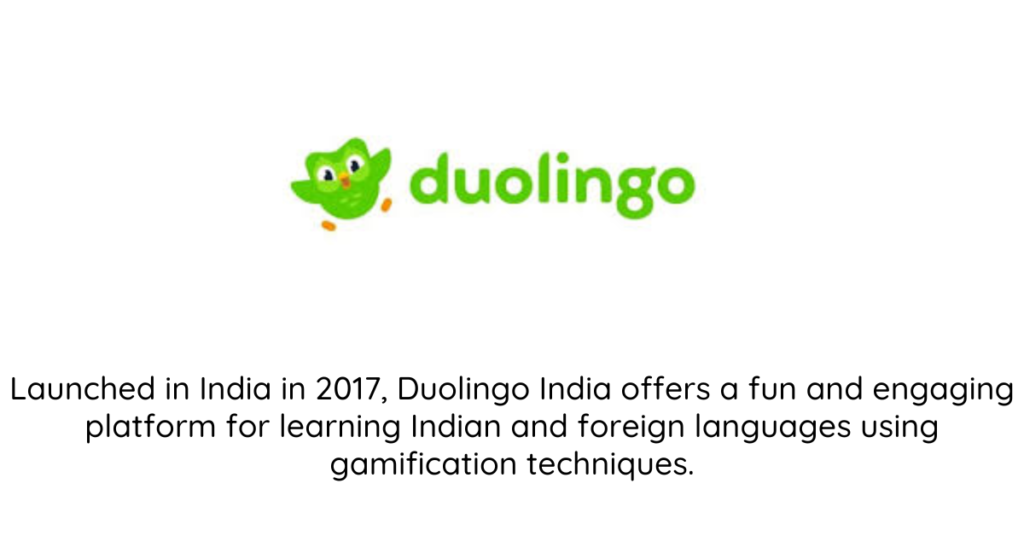
Duolingo India, a localized version of the global Duolingo platform, offers courses in various Indian languages as well as popular foreign languages. The platform uses gamification techniques to make language learning fun and engaging.
| ASPECT | DETAILS |
|---|---|
| Founded | 2011 (India launch: 2017) |
| Headquarters | Bengaluru |
| Services | Language learning app |
| Key Features | Gamification, diverse language offerings |
| Website | duolingo.com |
Duolingo India – Top 10 Language Learning Startups in India
2. Multibhashi
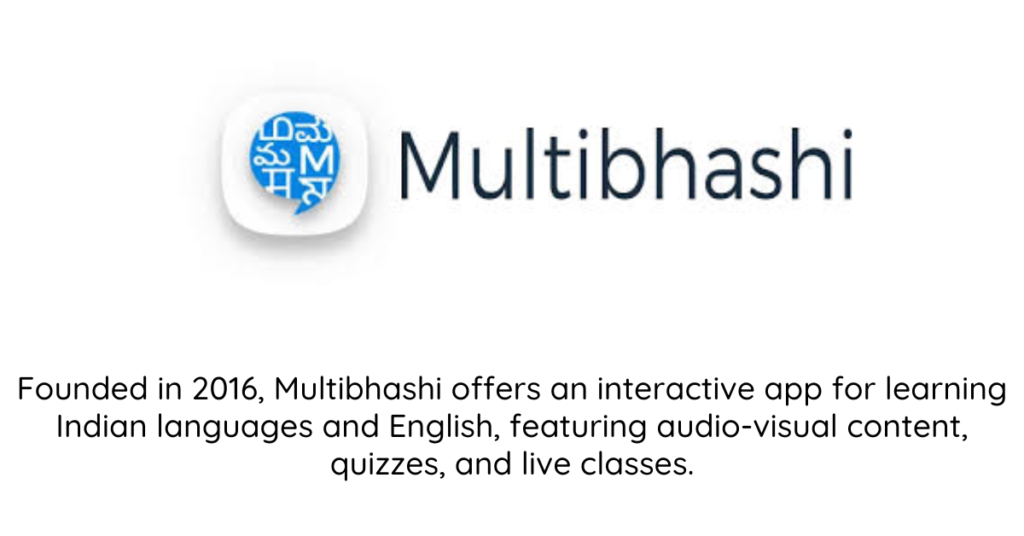
Multibhashi, founded in 2016 and based in Bengaluru, offers an interactive app to learn various Indian languages and English. The platform combines audio-visual content, interactive quizzes, and live classes to enhance the learning experience.
| ASPECT | DETAILS |
|---|---|
| Founded | 2016 |
| Headquarters | Bengaluru |
| Services | Language learning app |
| Key Features | Interactive content, live classes |
| Website | multibhashi.com |
Multibhashi – Top 10 Language Learning Startups in India
3. Language Curry
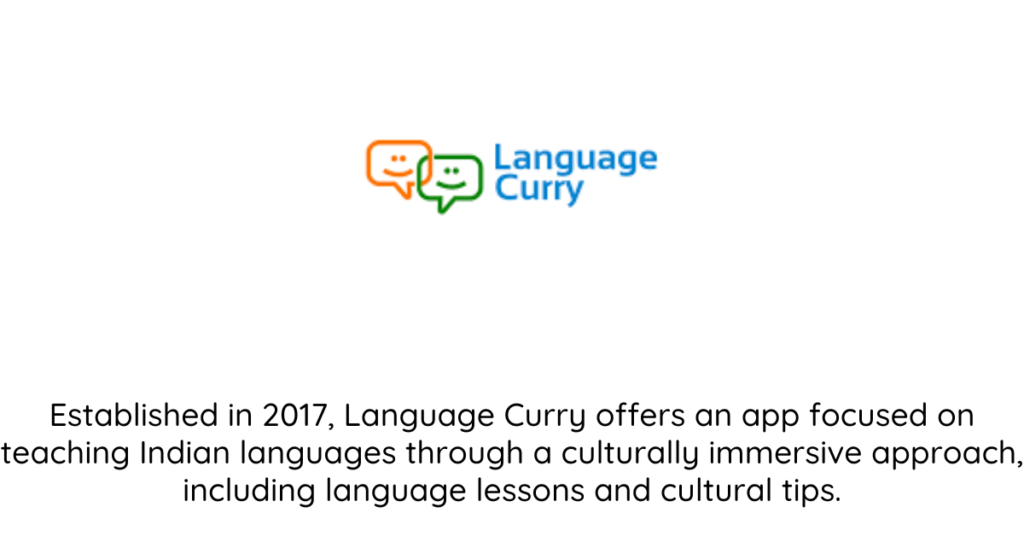
Language Curry, established in 2017 and headquartered in Gurugram, focuses on teaching Indian languages through a culturally immersive approach. The app includes language lessons, cultural tips, and practice exercises to facilitate learning.
| ASPECT | DETAILS |
|---|---|
| Founded | 2017 |
| Headquarters | Gurugram |
| Services | Language learning app |
| Key Features | Culturally immersive lessons, practice exercises |
| Website | languagecurry.com |
Language Curry – Top 10 Language Learning Startups in India
4. Enguru
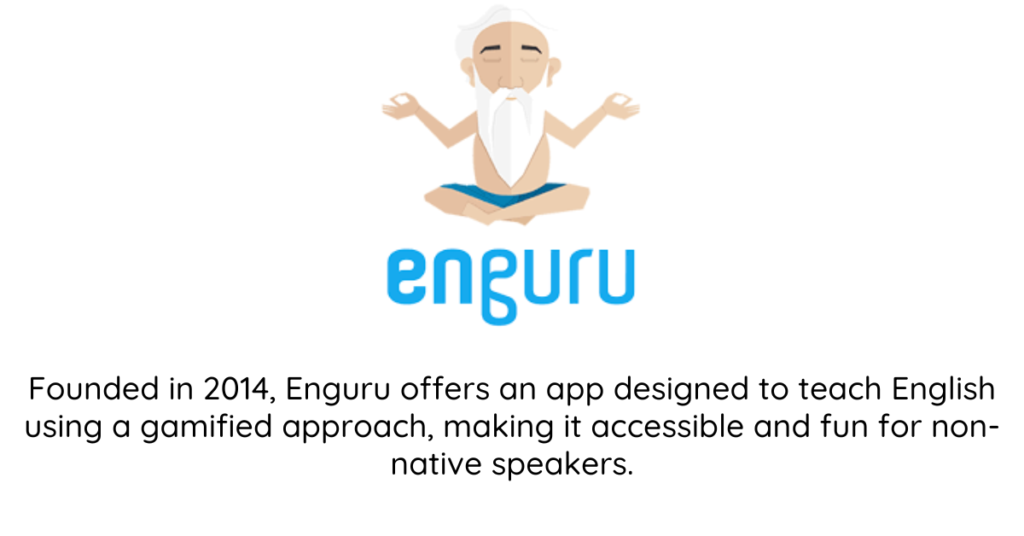
Enguru, founded in 2014 and based in Bengaluru, is an app designed to teach English in the context of various Indian languages. It uses a gamified approach to make learning English fun and accessible for non-native speakers.
| ASPECT | DETAILS |
|---|---|
| Founded | 2014 |
| Headquarters | Bengaluru |
| Services | English learning app |
| Key Features | Gamification, context-based learning |
| Website | enguruapp.com |
Enguru – Top 10 Language Learning Startups in India
5. Hello English
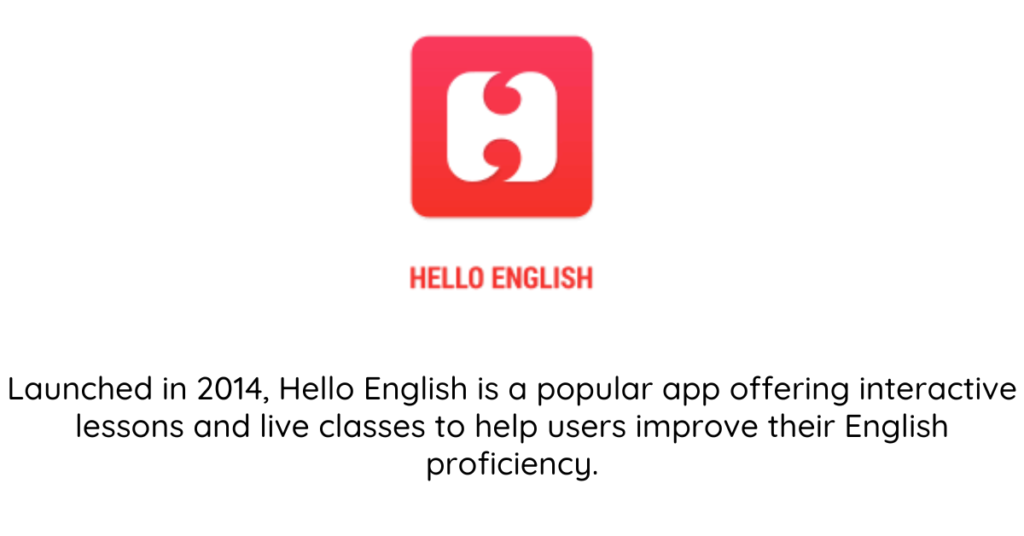
Hello English, launched in 2014 and headquartered in Jaipur, is one of India’s most popular English learning apps. It offers interactive lessons, practice exercises, and live classes to help users improve their English proficiency.
| ASPECT | DETAILS |
|---|---|
| Founded | 2014 |
| Headquarters | Jaipur |
| Services | English learning app |
| Key Features | Interactive lessons, live classes |
| Website | helloenglish.com |
Hello English – Top 10 Language Learning Startups in India
6. Voxy India

Voxy India, a localized version of the global Voxy platform, offers personalized English language courses tailored to the needs of Indian learners. The platform uses real-world content and adaptive learning technology to enhance the learning experience.
| ASPECT | DETAILS |
|---|---|
| Founded | 2010 (India launch: 2018) |
| Headquarters | New Delhi |
| Services | Personalized English courses |
| Key Features | Real-world content, adaptive learning |
| Website | voxy.com |
Voxy India – Top 10 Language Learning Startups in India
7. Lingvist India

Lingvist India, part of the global Lingvist platform, uses AI to personalize language learning experiences. The app adjusts lessons based on the user’s progress, making it efficient for learning both Indian and foreign languages.
| ASPECT | DETAILS |
|---|---|
| Founded | 2013 (India launch: 2019) |
| Headquarters | Bengaluru |
| Services | AI-powered language learning |
| Key Features | Personalized lessons, adaptive learning |
| Website | lingvist.com |
Lingvist India – Top 10 Language Learning Startups in India
8. SimpliLearn Languages

SimpliLearn, known for its professional courses, also offers language learning programs focusing on English and foreign languages. The platform combines video lessons, quizzes, and live interactions to enhance learning outcomes.
| ASPECT | DETAILS |
|---|---|
| Founded | 2010 |
| Headquarters | Bengaluru |
| Services | Language learning programs |
| Key Features | Video lessons, quizzes, live interactions |
| Website | simplilearn.com |
SimpliLearn Languages – Top 10 Language Learning Startups in India
9. Fluentify India
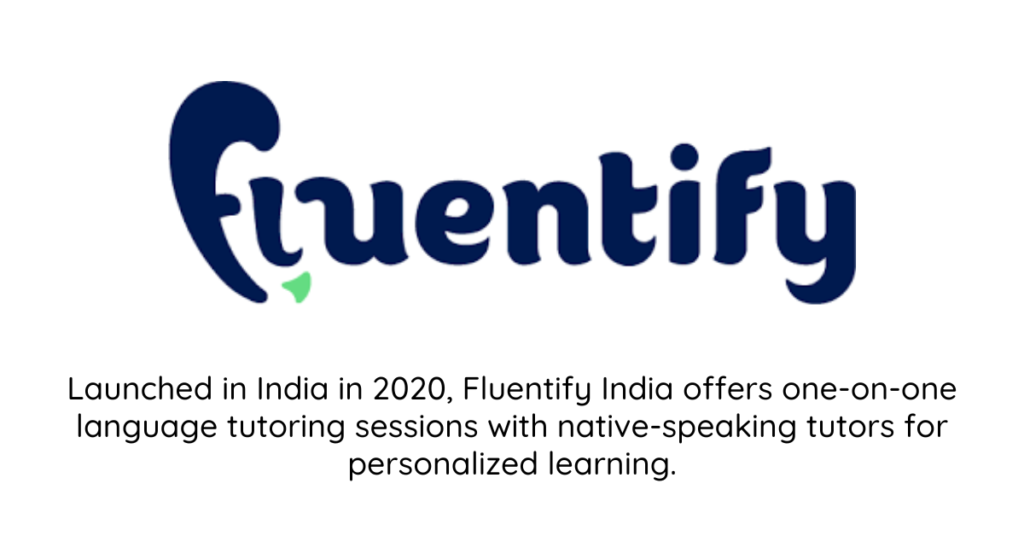
Fluentify India, part of the global Fluentify platform, offers one-on-one language tutoring sessions. The platform connects learners with native-speaking tutors for personalized lessons in various languages.
| ASPECT | DETAILS |
|---|---|
| Founded | 2013 (India launch: 2020) |
| Headquarters | Mumbai |
| Services | One-on-one language tutoring |
| Key Features | Personalized lessons, native-speaking tutors |
| Website | fluentify.com |
Fluentify India – Top 10 Language Learning Startups in India
10. Babbel India

Babbel India, a localized version of the global Babbel platform, provides comprehensive language courses tailored to Indian learners. The app uses practical dialogues and interactive exercises to facilitate language acquisition.
| ASPECT | DETAILS |
|---|---|
| Founded | 2007 (India launch: 2021) |
| Headquarters | Bengaluru |
| Services | Language learning app |
| Key Features | Practical dialogues, interactive exercises |
| Website | babbel.com |
Babbel India – Top 10 Language Learning Startups in India
FAQs about Top 10 Language Learning Startups in India
- What is a language learning startup?
- A language learning startup is a company that offers innovative solutions, often through digital platforms or apps, to help individuals learn new languages effectively and efficiently.
- How do language learning startups benefit users?
- They provide convenient, accessible, and often personalized language learning experiences through interactive apps, live classes, and gamified content.
- Are these language learning platforms suitable for beginners?
- Yes, most platforms cater to learners at all levels, from beginners to advanced, providing tailored content to suit individual needs.
- Do these startups offer courses in Indian languages?
- Many of these startups offer courses in Indian languages in addition to popular foreign languages, catering to diverse linguistic needs.
- Can I learn English on these platforms?
- Yes, several startups like Hello English and Enguru focus specifically on teaching English, especially for non-native speakers.
- Are the lessons interactive?
- Most platforms offer interactive lessons, quizzes, and live classes to engage learners and enhance the learning experience.
- How do these platforms ensure the quality of language education?
- They employ experienced language educators, use adaptive learning technology, and provide culturally relevant content to ensure high-quality language education.
- Is there a cost associated with these services?
- While many platforms offer free basic courses, advanced features, and personalized lessons often require a subscription or payment.
- Can these apps help with language proficiency exams?
- Yes, some platforms offer specific modules and practice tests to help learners prepare for language proficiency exams like TOEFL, IELTS, etc.
- What technologies do these startups use?
- They use AI, machine learning, gamification, and adaptive learning technologies to provide effective and engaging language learning experiences.
Conclusion
The rise of language learning startups in India reflects a growing interest in acquiring new languages, driven by personal, professional, and academic needs. These startups leverage cutting-edge technology, interactive content, and personalized learning paths to make language acquisition accessible and enjoyable. From English and Indian languages to foreign tongues, these platforms offer diverse options to suit the varying needs of learners. As the demand for multilingual skills continues to grow, these startups are poised to play a crucial role in shaping the future of language education in India, empowering individuals to connect, communicate, and thrive in a globalized world.
Also read:
- Top 10 BioTech Startups in india
- Top 10 Renewable Energy Startups in india
- Top 10 WaterTech Startups in india
- Top 10 Waste Management Startups in india
- Top 10 GreenTech Startups in india
- Top 10 SpaceTech Startups in india
- Top 10 Mobility as a Service (MaaS) Startups in india
- Top 10 Cyber Defense Startups in india
- Top 10 Legal Services Startups in india
- Top 10 Remote Work Startups in india
Last Updated on: Friday, June 28, 2024 10:51 am by Pioneer Today Team | Published by: Pioneer Today Team on Tuesday, June 18, 2024 11:08 am | News Categories: Trending


